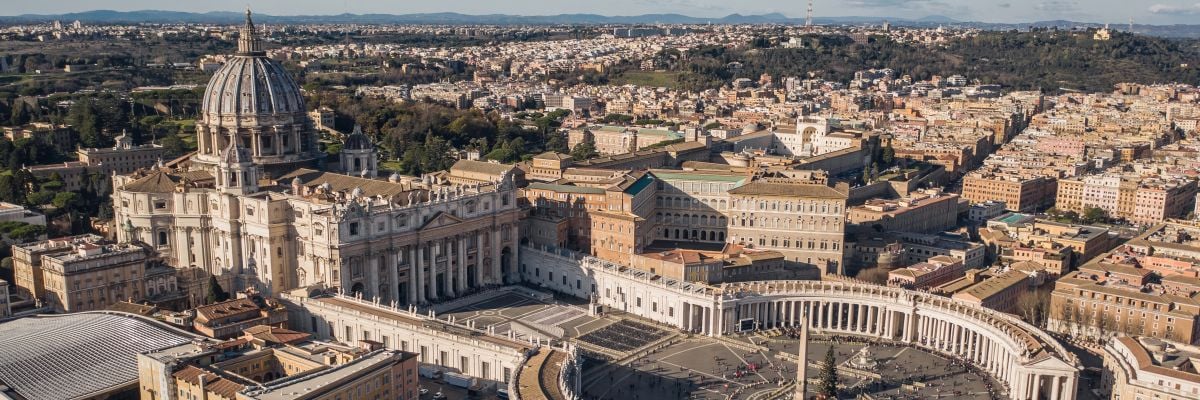
In my last blog post I examined the first of the four notes or marks of the Church—namely, unity. Today I would like to briefly examine the second defining mark or quality of the Church: holiness.
For many, the Catholic Church’s claim of holiness is quite provocative. After all, how can the Catholic Church possibly claim to be holy when her membership is made up of sinners? How can she claim to be perfect when some of her members (and even some of her leaders) have been found guilty of vile, scandalous, and gravely sinful deeds? Doesn’t this clearly invalidate her claim and demonstrate instead her profound lack of holiness?
Here are four points to consider when responding to such objections:
1. The Church is not holy because of her members. She is holy because her founder, Jesus Christ, is holy.
When we say that the Church is holy, we do not mean that all of her members have ceased to be sinners and have themselves become perfectly holy. On the contrary, the Church from the beginning, in her human dimension, has been composed of sinners (1 Tim. 1:15). The Catechism of the Catholic Church states that “all members of the Church, including her ministers, must acknowledge that they are sinners” (CCC 299). Yet the Church, properly understood, is not comprised solely of sinful human beings. St. Paul reminds us that Jesus Christ is the head of his body, the Church (Col. 1:18), and that the Church’s holiness is derived from her mystical union with Him (1 Cor. 12:12-13).
2. The Church is holy because the Holy Spirit (the Sanctifier) lives and dwells in her.
On the Feast of Pentecost, Jesus poured out the promise of his Holy Spirit upon the Church and filled her with supernatural life (Acts 2:1-4). Just as the Holy Spirit dwelt in the human body of Christ, so He now dwells in Christ’s mystical body and makes her holy. The Holy Spirit is the soul of the Church.
“For just as the body is one has many members, and all the members of the body, though many, are one body, so it is with Christ. For by one Spirit we were all baptized into one body” (1 Cor. 12:-12-13).
We read in the Catechism:
“The Church . . . is held, as a matter of faith, to be unfailingly holy. This is because Christ, the Son of God, who with the Father and the Spirit is hailed as ‘alone holy,’ loved the Church as his Bride, giving himself up for her so as to sanctify her; he joined her to himself as his body and endowed her with the gift of the Holy Spirit for the glory of God.” The Church, then, is “the holy People of God,”and her members are called “saints” (CCC 823).
3. The Church is holy because Christ has made of her an instrument of sanctification.
The Church was founded for no other reason than to continue Christ’s redemptive and sanctifying work in the world. By filling his Church with the Holy Spirit, Jesus has endowed her with supernatural life and the full means of salvation and sanctification. He has made the Church herald of his holy gospel, teacher of his holy doctrine, and minister of his holy sacraments (Mt. 28:19-20).
United with Christ, the Church is sanctified by him; through him and with him she becomes sanctifying. “All the activities of the Church are directed, as toward their end, to the sanctification of men in Christ and the glorification of God.”It is in the Church that “the fullness of the means of salvation”has been deposited. It is in her that “by the grace of God we acquire holiness” (CCC 824).
From the very beginning, the Church has been equipped with the means to help make holy the sinners who are found in her ranks. The Church has been entrusted with the holy sacraments along with the God’s holy word precisely in order to be able to help make sinners holy. It was in this sense that the Apostle Paul declared,
“Christ loved the Church and gave himself up for her, that he might sanctify her, having cleansed her by the washing of water with the word, that he might present the Church to himself in splendor, without spot or wrinkle or any such thing, that she might be holy and without blemish” (Eph. 5:25-27).
4. The Church on earth is endowed with a holiness that is real though imperfect.
There is an old latin axiom, “Ecclesia semper reformanda est” (The Church is always to be reformed). The Church, while possessing true sanctity from her divine source, is nevertheless always in need of reform and purification on account of the sinfulness of her members. She is therefore at the same time holy yet imperfect. The Catechism puts it this way:
“The Church on earth is endowed already with a sanctity that is real though imperfect.”In her members perfect holiness is something yet to be acquired: “Strengthened by so many and such great means of salvation, all the faithful, whatever their condition or state – though each in his own way – are called by the Lord to that perfection of sanctity by which the Father himself is perfect” (CCC 825).
The Church is therefore holy, though having sinners in her midst, because she herself has no other life but the life of grace. If they live her life, her members are sanctified; if they move away from her life, they fall into sins and disorders that prevent the radiation of her sanctity (CCC 827).
Therefore, when we speak of the Church’s mark of holiness, we always do so in reference to her divine source (The Holy Trinity) and to what the Church was established and empowered by God to do, and not the condition or status of her members.


